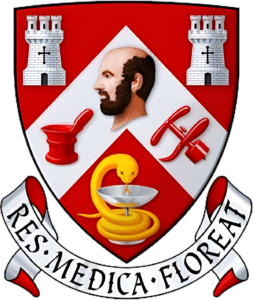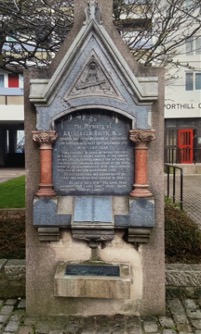Archibald Reith MD (1837-1895) was a deeply religious man who founded the New Porthill Sunday School in the Gallowgate. This monument commemorates almost thirty years he served as its superintendent. It was originally embedded in a wall of the Sunday School but, when this was demolished in 1960 to make way for a tower block, it was moved to its current site opposite Aberdeen College.
Reith was also a physician at Aberdeen Royal Infirmary who fell out with his clinical colleagues for introducing the practice of homoeopathy to the hospital. The threat of resignation by most of his fellow physicians forced the hospital managers to sack him. However, he continued to practise successfully as a general practitioner in Aberdeen and some years later was elected a manager of the Royal Infirmary. In 1888 he was elected president of the Aberdeen Medico Chirurgical Society.
He was born in 1837, the oldest son of George Reith, who was at the time Secretary of the Aberdeen Railway Company and his wife Jane. He was educated at Aberdeen Grammar School and Marischal College, graduating MB and MSCS England in 1858, and MD in 1859. He became a general practitioner in Aberdeen. Shortly after graduation he was elected as one of the medical officers of the Dispensary. His district was the Gallowgate and it was because he “knew every hole and corner” of his district he was asked to become superintendent of the Sunday school. In 1864 he was elected to the post of assistant physician in Aberdeen Royal Infirmary. This was a paid post and subject to annual re-election.
In 1868 while he was on holiday his beds in the Royal Infirmary were looked after by two clinical colleagues, Drs. Harvey and Smith. They were astonished to find that his patients were being treated by homeopathic remedies, and even when Reith prescribed orthodox medicines it was at a much lower dose than that recommended in the pharmacopoeia.
On his return from holiday the situation became acrimonious. Reith published a pamphlet Homoeopathy: It’s Nature and Relative Value (D Wyllie and Sons 1868). Alexander Harvey, who was a senior physician in the Infirmary, wrote to the hospital managers about “a difference of opinion on the subject of medical treatment in the Infirmary” and deploring “the introduction of the system of Homoeopathy into the Aberdeen Infirmary”. The management committee asked the consulting physicians of the hospital, Drs. Kilgour and Duce for their opinion. Local medical organisations were also asked their views, including Aberdeen Medico Chirurgical Society, the Buchan Medical Society and the Garioch Medical Association. The Local Member of Parliament and the Lord Provost also expressed views. While public opinion seems to have been favourable towards Dr. Reith, it was the almost unanimous “expressed opinion of the medical men of the City and District which is entirely adverse to the practice of homoeopathy they do not consider it advisable to give countenance to it within the Institution”. What forced the issue was a letter from the whole senior medical staff of the Infirmary threatening to resign if Dr. Reith was reappointed at the forthcoming annual election. It appears that Dr. Reith then resigned his position in the Infirmary. He had, however, considerable support mainly from lay people, but also some doctors. Some supported him on the basis of the right of doctors to clinical freedom. Others supported him personally as being “skilful and devoted to his profession, against whom not a charge had been made of rash, neglectful or injurious treatment of patients”. Two doctors cynically argued that although there was much foolery in homoeopathy no one had suggested it was any less successful than orthodox medicine.
The University of Aberdeen seems to have kept out of this debate. Although there had been concerns at the harm Reith’s influence might have on medical students, it was argued that although did some ward teaching he was not one of the clinical lecturers.
After these events Reith continued to practise as a homoeopathic GP in Aberdeen. In 1879 he was elected to be one of managers of Aberdeen Royal Infirmary and in 1888 became President of the Medico Chirurgical Society. About 1892 he had a severe bout of influenza and does not seem to have recovered from this. In 1894 he went to South Africa hoping to improve his health, but found the climate did not agree with him. He sailed back to Britain on the Norham Castle but died while the boat was still at sea, off Dungeness. His body was returned to Aberdeen and was buried in Nellfield Cemetery. One of his sons, George Reith, a church minister, wrote his biography.


